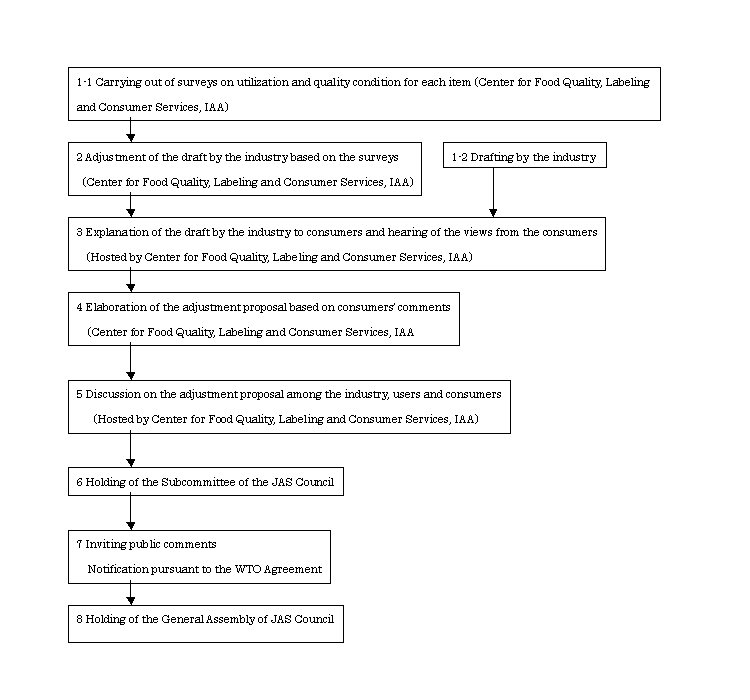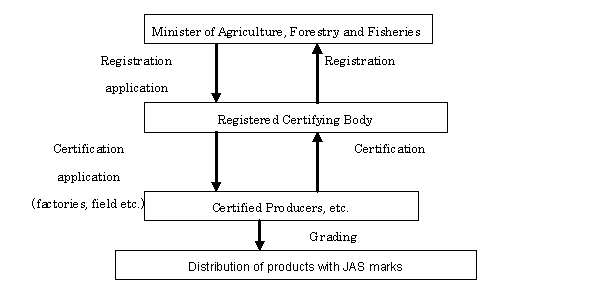
(1) PURPOSE OF THE LAW AND SYSTEM
"JAS" is the abbreviation for "Japanese Agricultural Products" established by the Minister of Agriculture, Forestry and Fisheries, in order to:
1) improve the quality of food and other products;
2) steamline production;
3) achieve simple and fair transaction; and
4) rationalize use and/or consumption,
thereby contributing to the promotion of public welfare.
(2) OUTLINE OF THE LAW AND SYSTEM
The law consists of two systems.
1) JAS Standard System: Products which are graded that they comply with the JAS standards are able to carry the JAS mark.
2) Quality Labeling Standard System: All manufacturers and distributors are required to label under the Quality Lableing Standards designated by the Minister of Agriculture, Forestry and Fisheries, provide cosumers with information on informed choices. Furthermore, imported products also may be subject to this system.
(3) GOVERNMENT ORDINANCE AND MINISTERIAL ORDINANCES
-The Enforcement Ordinance of the Law Concerning Standardization and Proper Labeling of Agricultural and Forestry Products
-The Enforcement Regulations of the Law Concerning Standardization and Proper Labeling of Agricultural and Forestry Products
(4) OUTLINE OF SPECIFICATIONS, STANDARDS AND INSPECTIONS, ETC.
The Japanese Agricultural Standard (JAS) is generally composed of 1) scope of application, 2) definition, 3) criteria and 4) methods of measurements, and categorized into two types.
General JAS: standards for grade, composition and performance.
Specified JAS: standards for method of production.
i. Specifications and Standards
JAS are Standards of agricultural and forestry products relating to quality such as grading, composition and performance or relating to production methods.
Establishing, revising or abolishing JAS Standards needs a decision made by the Council for Agricultural and Forest Products Standards (JAS Council) which is comprised of stakeholders such as representatives of consumers, producers and distributors and researchers. Also, international standards shall be taken into account for the above legislation (Articles 7). Furthermore, the JAS standards should be reviewed within every 5 years (Article 10).
The number of established JAS standards as of March 2006 is 217 (71 items),
of which 168 standards (39 items) are for "foods and drinks",
34 standards (18 items) are for "forestry products etc.," and
13 standards (12 items) are for specific standards, including those for
organic products and naturally grown chicken (Jidoriniku).
[Flowchart of establishment and amendment of the JAS standards and quality labeling standards]

ii. Certification System
In order to affix the JAS mark, manufacturers, etc. must be certified by Registered Certifying Bodies (Article 14, 15, and 15-2)
[Grading System under the revised JAS Law]

(5) HIGHLIGHTS OF THE RECENT AMENDMENT
The Law Concerning Standardization And Proper Labeling Of Agricultural And Forestry Products was revised in June 2005 (took effect on March 1, 2006). Principal revisions were establishment of JAS concerning standards for distribution method, and improvement of the Registered Certifying Body System (the abolishment of the certifying system of business entities conducted by the Minister of Agriculture, Forestry and Fisheries, changing the role to monitoring, and the abolishment of requirement that Certifying Bodies have to be located in the countries with equivalent system to the JAS system).
(6) REFERENCE INFORMATION
(Liaison Office for Further Information)
Labeling and Standards Division, Food Safety and Consumer Affairs Bureau,
Ministry of Agriculture, Forestry and Fisheries
Tel: 03-3501-3727 http://www.maff.go.jp
[List of JAS registered grading organizations]
http://www.maff.go.jp/soshiki/syokuhin/heya/new_jas/list_ninteikikan.html